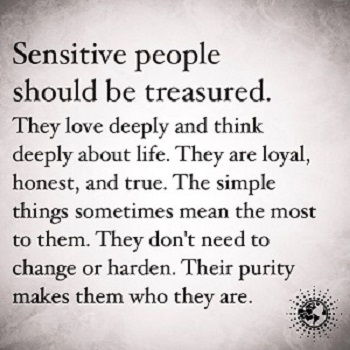Stop being so sensitive!

“Relax! What’s the big deal?”
“Get over it!”
“You’re such a drama queen!”
“You’re too sensitive.”
Sound familiar? Perhaps you have been hearing these things all your life.
Or perhaps you find yourself saying them quite often to a close friend, colleague or family member.
If so, it’s likely you either are, or live in close contact with, a highly sensitive person. And if so, it’s likely that you experience all the advantages and difficulties that go along with it.
What is a Highly Sensitive Person (HSP)?
Highly sensitive people, or HSPs, make up about 20% of the population. They have inherited nervous systems that seem designed to react to more subtle experiences and recover more slowly than others from intense stimulation. It takes them longer to “get over it”.
HSPs are aware of subtleties in their environment “just in case” they develop into a threat—for example grey clouds and wet pavements, irritable expressions—and can have trouble filtering out stimuli.
For example, an HSP on a bus will notice the mood of the driver, the mother having trouble with her child, the couple in love and the man with the skin condition. Meanwhile the non-HSP will notice none of these things.
With so many stimuli to respond to, the fear center in the HSP’s brain is never asleep. HSPs are not necessary chronically aroused, but they are certainly more aroused than others by new or prolonged stimulation.
When uncomfortable, the message they are getting is that something is wrong in themselves or in their environment, and they feel unsafe. Being sensitive to even subtle changes means that this discomfort can seem intolerable.
HSPs can be become fearful of their own thoughts
HSPs even perceive their own internal thoughts as threatening at times. They are more easily overwhelmed when they have been out in a highly stimulating environment for too long, bombarded by sights and sounds that leave their nervous systems feeling exhausted.
Being an HSP is a bit like being a sponge, with limited or no ability to stop the environment from soaking into your fibers.
An HSP can’t walk into a party and merely notice the people and the furniture. She can actually be instantly aware of the mood, the friendships and hostilities between people, the freshness or staleness of the air. She won’t necessarily judge these things, but it’s very hard for her not to notice them, and not to feel the nervous over-arousal of being in a new environment. This arousal is experienced as anxiety, and leads eventually to a feeling of being overwhelmed.
There are many, many positive aspects of being sensitive.
For example:
- HSPs are better at spotting errors and at avoiding making errors. The perfectionist is likely to be an HSP.
- They are able to concentrate deeply (although they do so best without distractions) and are highly conscientious.
- They are usually very empathic and compassionate people, as they are deeply affected by other people’s moods and emotions.
HSPs spend a good deal of time thinking about their own thinking, but this is not self-centeredness so much as inner reflection and musing.

